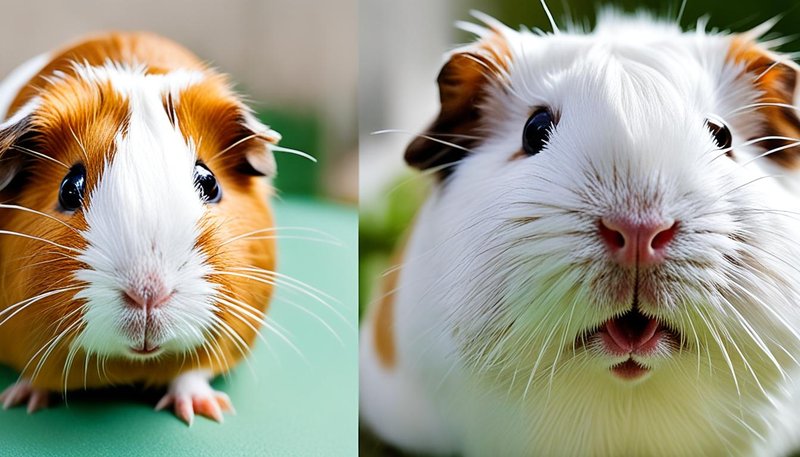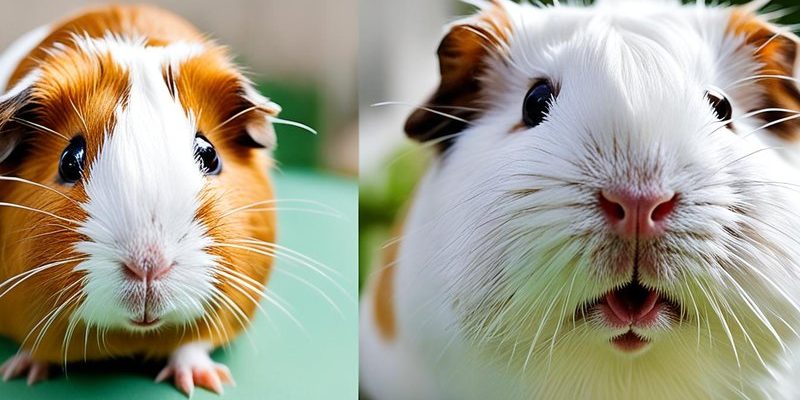
These adorable creatures can face challenges like dental issues, skin problems, and respiratory infections. The good news? Many of these health concerns are preventable with the right knowledge and a proactive approach. Let’s dive into some common health issues and explore simple ways you can help your Coronet guinea pig live a long, vibrant life.
Dental Problems: The Chewing Dilemma
One of the most common health concerns in Coronet guinea pigs is dental problems. They have continuously growing teeth, which means they need to chew on things to wear them down. When they don’t get enough wear, their teeth can overgrow, causing pain and difficulty eating. Picture this: if you were trying to eat with a broken tooth, it wouldn’t be pleasant, right? Guinea pigs feel the same way.
To prevent dental issues, you should provide a diet rich in hay, fresh veggies, and chew toys. Timothy hay is a fan favorite—it’s fibrous and helps to keep those teeth in check. Regularly check their teeth, too. If you see any signs of overgrowth or misalignment, it’s time for a vet visit. Remember, keeping their teeth healthy is as essential as making sure they have a good meal.
Skin Issues: The Fur Follies
Coronet guinea pigs are known for their lovely, long fur, but that also means they can have skin problems. Conditions like mange mites or fungal infections can make their skin itchy and uncomfortable. Have you ever had a rash that just wouldn’t go away? Imagine how your little buddy feels!
To prevent skin problems, keep their living environment clean. Regularly spot-clean their cage and change bedding to avoid moisture buildup—mold loves damp spaces. You should also groom your guinea pig often, as this helps remove loose fur and dirt. If you notice excessive itching, scabs, or hair loss, it’s time to consult your vet for a diagnosis and treatment.
Respiratory Infections: The Breathing Troubles
Respiratory infections are another concern for guinea pigs. Their lungs are delicate, and factors like cold drafts, poor ventilation, or exposure to dust can lead to illnesses like pneumonia. It’s like catching a nasty cold, but they can’t tell you what’s wrong. Instead, you might notice them sneezing, wheezing, or having labored breathing.
To keep their lungs healthy, ensure their living area is well-ventilated and avoid using scented bedding or cleaning products. Having a consistent temperature helps, too—guinea pigs thrive in a comfortable, warm environment. If you see any signs of respiratory distress, seeking veterinary care promptly can save them from serious issues.
Obesity: The Overeating Pitfall
Did you know that guinea pigs can become overweight if they eat too many pellets or high-calorie treats? Overeating is a common issue, especially if they’re not getting enough exercise. You wouldn’t want to feel sluggish all the time, right? Neither do they!
To prevent obesity, you should offer a balanced diet. Fill their bowl with high-fiber hay and fresh veggies, while limiting pellet portions to a small daily amount. Encouraging playtime outside of their cage, along with providing tunnels and toys, can engage them physically. Keeping them active is like encouraging your friend to hit the gym—it benefits both body and mind!
Urinary Tract Issues: The Pee Problems
Urinary tract issues can occur in guinea pigs and often manifest as painful urination or blood in the urine. It’s frightening to think about, but these issues can stem from urinary stones or infections. Imagine if you had to hold in discomfort every time you used the bathroom—that’s what they experience.
Preventing urinary issues starts with hydration. Ensure that your guinea pig always has access to fresh, clean water. You can also add fresh veggies with high water content to their diet, like cucumbers and bell peppers. Monitoring their litter box can help catch any signs of trouble early. If you notice any unusual changes, a trip to the vet is crucial.
Overcrowding and Stress: The Social Challenge
Guinea pigs are social creatures, and they thrive when they have companionship. However, overcrowding can lead to stress and conflicts among them. Imagine trying to share a small space with too many friends and no room to breathe—that’s how they feel!
To prevent overcrowding, make sure they have enough space in their cage—at least 7.5 square feet for a pair of guinea pigs. You can also give them plenty of hiding spots to keep the peace. If you already have a bonded pair, keep an eye on their interactions. If you notice signs of aggression or stress, it might be worth separating them. Their happiness is your priority!
Regular Veterinary Check-Ups: The Gold Standard
Last but not least, regular vet visits are essential for keeping your Coronet guinea pig healthy. They can’t tell you when something’s off, so it’s up to you to ensure they’re in tip-top shape. Think of the vet as your guinea pig’s personal health coach, helping catch any issues before they escalate.
Schedule routine check-ups at least once a year. During these visits, the vet will check their teeth, skin, and overall health. If you have concerns in between visits, don’t hesitate to reach out sooner. Just like you wouldn’t ignore an unusual symptom in yourself, being proactive about your guinea pig’s health is crucial.
Final Thoughts: Your Role in Their Health
Keeping a Coronet guinea pig healthy involves a bit of knowledge and a lot of love. By being aware of common health concerns and taking preventive measures, you can help your furry friend live a happy and fulfilling life. Monitor their diet, living conditions, and overall well-being, and don’t forget the importance of regular vet visits.
You’re not just a pet owner; you’re a guardian of a creature that brings joy and laughter into your home. With your guidance and care, your little pal can thrive and enjoy every moment spent by your side.

